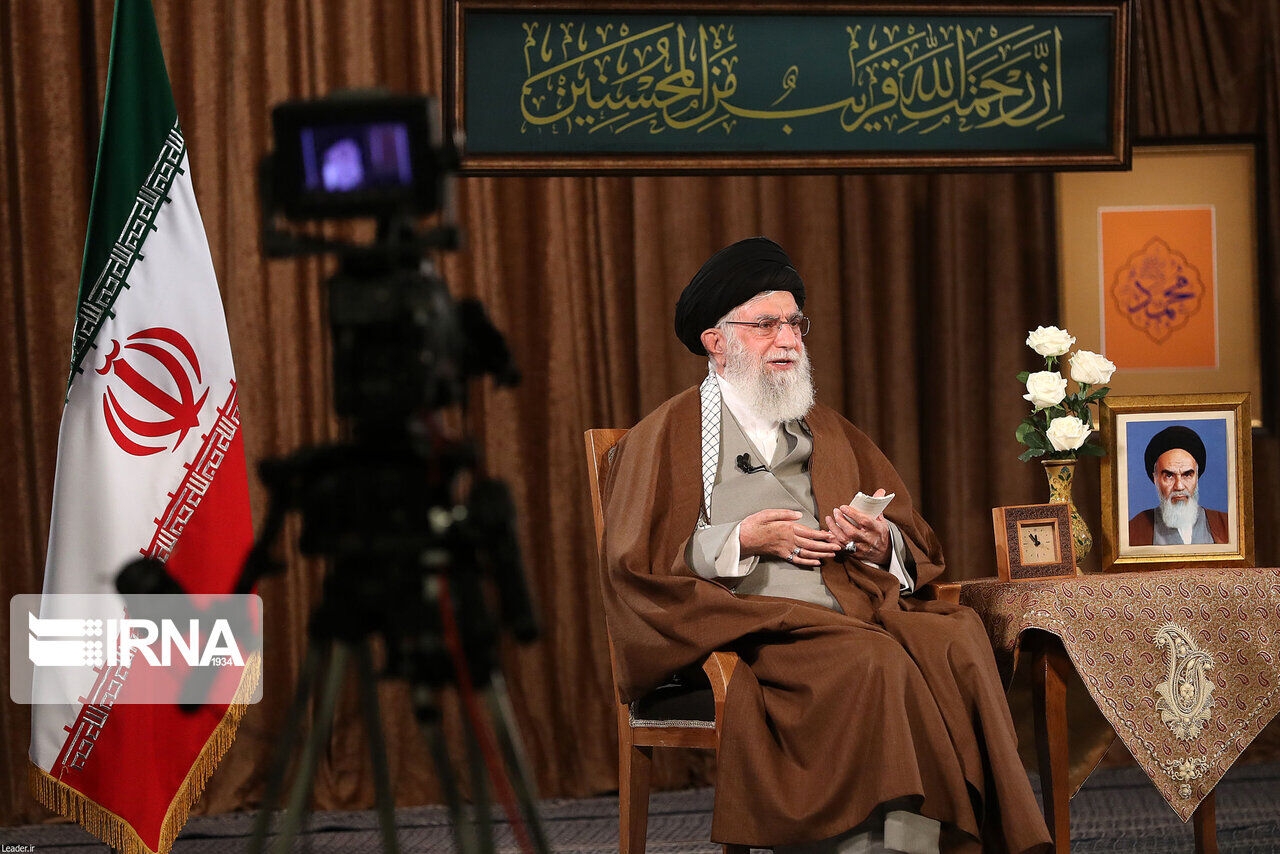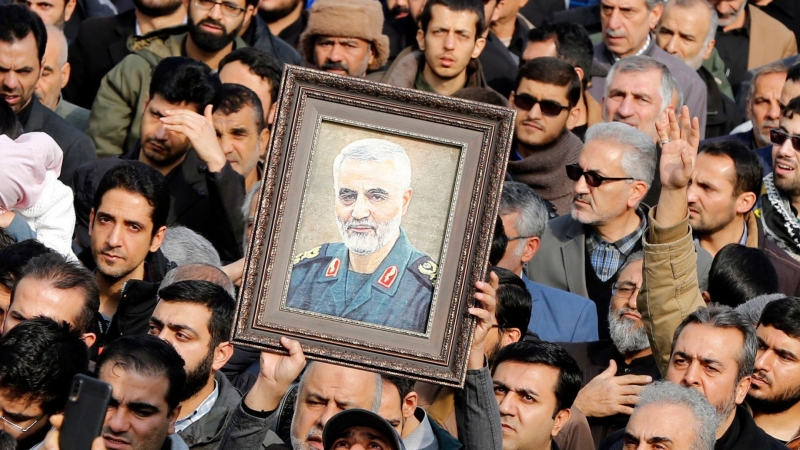Third Anniversary Of The Martyrdom Of General Qassem Soleimani
Developing Just LeadershipTahir Mustafa
Jumada' al-Akhirah 08, 1444 2023-01-01
Main Stories
by Tahir Mustafa (Main Stories, Crescent International Vol. 52, No. 11, Jumada' al-Akhirah, 1444)
Three years after his assassination outside Baghdad International Airport in the early hours of January 3 (2020), General Haj Qassem Soleimani lives in the hearts of not only the people of Iran but also most freedom-loving people worldwide. The martyred revolutionary general had just arrived on Cam Air flight from Damascus. He was received by Abu Mahdi al Muhandis, a fellow revolutionary and the deputy head of Hashd al Sha‘abi (Iraq’s Popular Mobilization Units - PMU) at the airport.
Let us recall what happened on that fateful night three years ago. A US drone hovering overhead fired two missiles destroying the vehicle in which the head of Iran’s Quds Force and his companions were traveling. The vehicle was completely destroyed and all its occupants were martyred.
The strike was ordered by Donald Trump, a war criminal, who was then serving as president of the United States. Today, Trump faces charges of tax fraud and other misdemeanors but these are small matters compared to the crime he ordered to be committed at Baghdad airport. It was a war crime and Trump must face charges for this crime, at the appropriate time.
General Soleimani was no ordinary person. He did not arrive in Baghdad for a chance visit. He was carrying an official letter from Iran’s leadership to the Saudis to be delivered through then Iraqi Prime Minister Adel Abdul Mahdi. This was in response to a Saudi message about de-escalating tensions between Riyadh and Tehran as well as trying to end the Saudi war on Yemen. In other words, he was on a diplomatic mission.
By ordering the missile strikes on Iraqi territory, Trump violated its sovereignty. He also acted against international law and the UN charter (for what they are worth). Trump and a long list of his predecessors are not constrained by international law or respect for other countries’ sovereignty.
American author William Blum sums up succinctly US policy. “If you flip over the rock of American foreign policy (throughout) the past century, this is what crawls out: invasions, bombings, (subversion), overthrowing governments, suppressing (popular) movements for social change, assassinating political leaders, perverting elections, manipulating labor unions, manufacturing ‘news’, death squads, torture, (chemical), biological (and nuclear) warfare, (radiological contamination), drug trafficking, mercenaries, police state repression, and endless wars on humanity.”
It needs emphasizing that this is the assessment of an American author, not some anti-American revolutionary from a third world country. There are many other Americans who are equally critical of US domestic and foreign policies although their voices are drowned in the din of propaganda.
The critics include the late David Ray Griffin, Chris Hedges, Professor Stephen M. Walt, Professor Francis Boyle and a host of others. We must also include courageous people like Edward Snowden who exposed US crimes through the Internet and had to flee the country to seek asylum in Russia. The regime in Washington wanted to punish him telling the truth. This is what is happening to Julian Assange, another whistle blower who revealed millions of pages of documents about US war crimes worldwide.
So, there is little doubt about American war crimes. What is holding the prosecution of these war criminals is the unjust and highly corrupt system imposed on the world. It is dominated by the US and such other oppressive regimes as those in Britain, France, zionist Israel etc., all allied with the Great Satan.
General Qassem Soleimani was extremely popular in Iran. This became evident during the funeral processions that were held for him in various cities of Iran including Ahvaz, Mashhad, Tehran, Qom and his hometown of Kerman. Millions of people came out to pay respects to the great martyred revolutionary. The Rahbar, Imam Seyyed Ali Khamenei had called General Soleimani a “living martyr of the revolution” for his great services to promote the cause of the Islamic revolution and of justice globally. When Trump ordered his assassination, he actually achieved martyrdom and became a legend.
Committed Muslims do not shy away from martyrdom. They know that this life is ephemeral; the foremost duty of every committed Muslim is to struggle in the way of Allah. This struggle has only two outcomes: victory or martyrdom.
General Soleimani achieved great victories during his life-time against the Daesh terrorists (aka ISIS) and frustrated US-zionist-Saudi designs in the region. He was often seen at the warfront directing operations against the terrorists.
His martyrdom was an attempt to weaken the Islamic revolution. The enemies of Allah do not understand that it is the blood of martyrs that protects and nurtures a revolution. The Islamic revolution stands strong despite the undoubted loss of General Soleimani.
Martyrdom, however, is a concept unknown in the hedonistic culture of the west. For Muslims, it is an honor that they pray for. When a Muslim achieves martyrdom, he achieves eternal life. This is what the noble Qur’an states: “And say not of those slain in Allah’s cause, ‘They are dead’: nay they are alive, but you perceive it not” (2:154).
Martyrdom is one of the most important means of safeguarding the values of the Islamic Revolution because it promotes the culture of self-sacrifice. If the Islamic Revolution stands strong today, it is because hundreds of thousands of young men and women offered their life and blood for its preservation and protection.
General Qassem Soleimani was a true son of the revolution. Born into a modest family, he came through the anvil and fire of the Iraqi-imposed war. The Iraqi tyrant Saddam Husain, at the behest of his western masters and Arabian allies, invaded the Islamic Republic in September 1980.
Millions of Iranian youth joined the war effort to defend the Islamic revolution. The young Qassem Soleimani joined the Sepah-e Pasdaran-e Inqilab-e Islami (the Islamic Revolutionary Guard Corps--IRGC) and served at various fronts gaining acclaim for his self-sacrificing spirit and brilliance.
After the war, he quickly rose through the ranks to become a general in the IRGC. In 1998, he was appointed head of the Quds Force whose responsibilities include mobilizing Muslims in defence of Masjid al Aqsa as well as the liberation of Palestine.
He established close links between Palestinian Islamic groups Hamas and Islamic Jihad as well as Hizbullah in Lebanon. In fact, was in Lebanon to meet Hizbullah chief Seyyed Hasan Nasrallah before driving to Damascus to take the flight to Baghdad.
It was through his untiring efforts that the Islamic resistance in Occupied Palestine has become so effective. Not surprisingly, Hamas chief Ismail Haniyeh attended his funeral in Tehran and paid rich tribute to his sacrifices for Palestine and al-Quds.
During Jumuah Khutbah after General Soleimani’s funeral, the Rahbar, Imam Seyyed Ali Khamenei had said that the best response to US crime would be to expel it from the region. Recent developments show that this policy is on track. The martyred general’s life-long struggle will be realized sooner rather than later, in sha’Allah.



